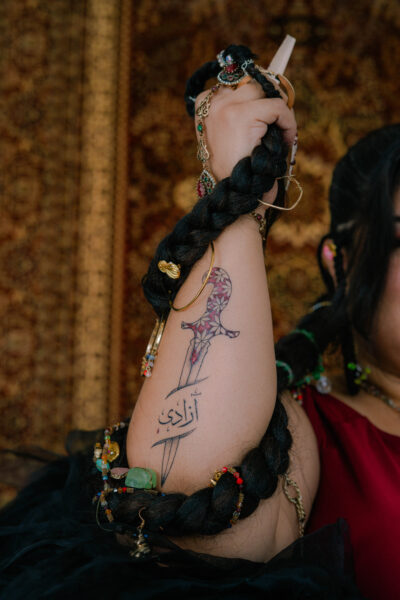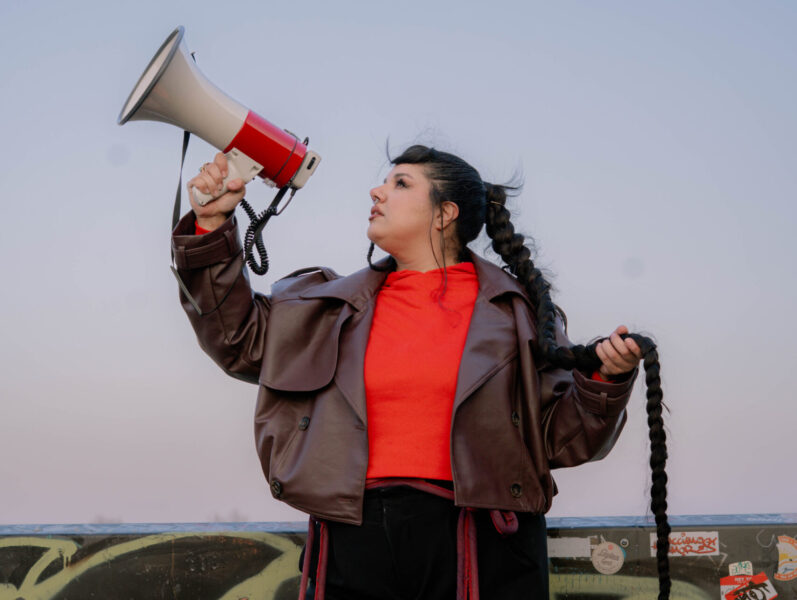OFFKEY: Faravaz, you are about to release your debut record, Azadi, which translates to “Freedom”. What inspired the album?
Faravaz: It is my story. Each song tells a story connected to my life, experiences, and traumas, but also my continuous struggle for freedom. Music is my way of fighting back against a world dominated by patriarchy. Growing up in Iran and now living in Germany, this is something that I constantly feel. I think the lives and the pain of everyone affected by patriarchy are connected. Telling stories like that, telling my stories, sparks imagination, and that is needed to change the world.
In Songs like “Mullah” and “Enemy of God” you explicitly call out those trying to forcefully limit freedom. Both songs are kind of tongue-in-cheek and have a humorous aspect to them, but the underlying emotion is anger at the system of oppression and those who uphold it. Is anger another driver for your music?
Definitely. I remember being told to be calm, quiet, and not to speak loudly ever since I was little. But I never liked being told what to do. I don’t want to be calm and polite. I am an angry woman. Art to me is a place to express that and not a place to be polite. It is a place for rebellion and doing the things others try to forbid you from doing or try to make you feel ashamed for.
One of the tools I fight with is provocation, to raise anger and attention. I think I am good at provoking. Art is supposed to move something and what makes people angry, makes them move.
My Body is My Home
In the song “Dessert,” you sing about deserving to eat and enjoy dessert, which is another thing you were told not to do. Especially as a fat person, as a fat woman, society tells you that it is not okay to be this way and that you have to diet to be likable. What is the message that you want people to take away from the song?
As a child, I was told that because I am fat, I shouldn’t enjoy food, and that no man will find me desirable. Fatphobia and misogyny make you feel ashamed of your body. Fuck that. I do deserve dessert. When I wrote the song, I realized that it is about more than just enjoying food as a fat person. It is about having fun, dancing, having sex, being naked, and just existing in this body. 
What helped you get to that point?
I learned a lot about feminism and body positivity, and exchanged with people who experience similar things to me. It might sound simple, but I also unfollowed everyone on social media who made me feel shit about my body and myself.
In the documentary “My Orange Garden” as well as in the video to “Dessert” you show yourself completely naked or almost naked. Why is it important to show yourself this way?
To keep us subjugated, they attack our bodies and tell us what to do and not do with them. In Iran, if you are a woman and you sing, you can be arrested for that. There are so many rules controlling us and our bodies. By showing my body the way I want, I am protesting that. I also want to normalize naked bodies, women’s bodies, and fat women’s bodies presented not through the lens of patriarchy.
For a long time, I felt like I didn’t have a home. Iran was not home, because it was not safe, and Germany is also not a home. The only home I have is my body.
Jin, Jîyan, Azadî
You are releasing your first solo album, something that would not be possible in Iran because it is forbidden for women to sing solo. Yet, there are many people who, like you, are fighting back against the rules of the Islamic government. In the underground, women sing despite the danger. Especially since the murder of Jina Mahsa Amini sparked the global wave of feminist protests “Jin, Jiyan, Azadî” in solidarity with women in Iran and Kurdistan, pressure on the government has been building. Faravaz, how do you perceive the situation for female singers in Iran at the moment?
I know many female singers and rappers in Iran who are amazing. For most of them, social media is the only way to get their voice out and to make themselves heard. Both TikTok and Instagram are banned in Iran, yet they find ways to work around it and to reach an international audience. To protect themselves, many, like the rapper Hanie, cover their faces. In recent years, I have been witnessing women becoming braver and braver in their fight for their rights, but the government is also pushing back with more violence.
You have been speaking about this and fighting for women’s rights for many years now. Where do you draw energy from to keep up the fight?
I think it is key that we stay nourished and support one another. You have to protect your body, but you also have to protect your mind. One way I do that is to find the joy in everything I do. Using art and singing, two things I love, helps me to keep going.


The Right to Sing
Speaking of supporting one another, from exile in Germany, you have launched The Right to Sing, an Instagram platform to empower and support female singers in Iran.

Yes, I left Iran, and I can do what I do now, but there are many still in Iran who cannot. With The Right to Sing, I want to use my position to support others. On our Instagram platform, we share their music and messages and collect donations so that they can produce music. They can also reach out if they are in danger, arrested, or need to leave the country. We do everything we can to support them from abroad and connect them to the right people. The social media platform is also a way to raise awareness of what is still happening to female singers in Iran.
Many artists who share their message on social media are later persecuted by the government forces or charged, as you were. Is it safe for them to share their videos?
The artists we share want to be seen, and they know the risk. Singing as a woman is risky, but staying quiet is not an option. When I was still in Iran, I also kept singing because it is what I love doing most. All this time, I knew the risk; I knew that one day, they might come for me. When women burn their hijabs or leave the house without them, we know what it might cost us. But this is protest. This is the fight we have to fight.
Azadi by Faravaz will be released on the 11th of May, and the artist will play a release show in Berlin at SO36 on the same day. You can get your tickets here and follow Faravaz on Instagram to stay up to date.



